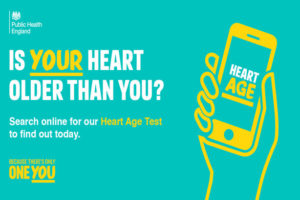The Heart Age Test is an online heart age calculator created by UK health organizations for users to assess how their cardiovascular heath aligns with their chronological age. To check their risk of heart attack or stroke, users answer 16 questions about their physical health and lifestyle choices. In addition to revealing the user’s heart age compared to their real age, the tool also gives advice on how to reduce heart age and explains why it’s important to know one’s blood pressure and cholesterol numbers. To take the test, the user must be above the age of 30 and not have a history of cardiovascular disease. The calculator, released on September 4th, is a collaboration between the National Health Service, Public Health England, University College London and the British Health Foundation.

Credit: prweek.com
According to the Centers for Disease Control and Prevention, cardiovascular disease accounts for one in four deaths in the United States. Heart disease is the leading cause of death for both men and women. Every year in United States, around 735,000 people suffer a heart attack, and around 610,000 die from cardiovascular disease. So far, more than 1.9 million people in England have taken the Heart Age Test, and of those almost four-fifths discovered that they have a heart that is older than their chronological age.
Many people at risk of cardiovascular disease don’t know their risk factors or that it is possible to reduce your risk through important lifestyle changes. Professor Jamie Waterall, national lead for cardiovascular disease at Public Health England, the organization that unveiled the heart calculator, said, “Taking a Heart Age Test is something you can easily do at home, but it could be one of the most important things you do to help you live a healthy longer life.”
The Heart Age Test asks for the user’s age, height and weight, as well risk factors such as smoking, diabetes, arthritis, blood pressure, and cholesterol. It also asks for user’s ethnicity, gender, and postal code, since these factors play into risk assessment as well. After calculating the user’s heart age, the Heart Age Test then calculates how likely it is that they will suffer a heart attack or stroke over the next decade. The user than has the option of seeing how their heart age and life expectancy will improve if they lose weight, lower cholesterol and reduce blood pressure. Changing one of those major risk factors or any combination of the three will yield different results.
Major Risk Factors for Heart Disease
One modifiable risk factor of cardiovascular disease is cholesterol. Cholesterol levels can be measured with a simple blood test, which determines levels of bad cholesterol, good cholesterol, and triglycerides. People can often improve these values by reducing the amount of saturated fat in their diet, eliminating trans fats, eating foods rich in omega-3 fatty acids, increasing soluble fiber intake, and adding whey protein to their diet.
Getting an adequate amount of exercise is also crucial to maintaining heart health. John’s Hopkins researchers recommend at least 150 minutes per week of moderate aerobic activity, two nonconsecutive days per week of resistance training, and stretching every day and before and after exercise.
Quitting smoking may be the most significant factor in reducing the risk of cardiovascular disease. According to the American Heart Association, smoking increases blood pressure and increases the tendency for blood to clot, and people who smoke are two to four times more likely to get heart disease than nonsmokers. Quitting is one of the best things you can do for your heart health.

 Free Online Heart Age Test Determines Cardiovascular Age
Free Online Heart Age Test Determines Cardiovascular Age



 Funeral Favors Offer Visitors a Tangible Memento
Funeral Favors Offer Visitors a Tangible Memento
 “Comeback” by Prince
“Comeback” by Prince
 “Other Side” Documents Woman’s Fight To Die As She Wishes
“Other Side” Documents Woman’s Fight To Die As She Wishes














